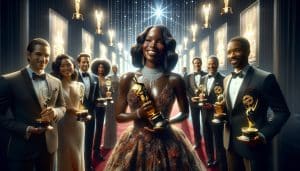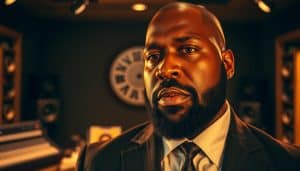Key Takeaways
- Chadwick Boseman’s breakthrough came with his portrayal of Jackie Robinson in “42” (2013), establishing him as an actor with exceptional range and emotional depth.
- His iconic role as King T’Challa/Black Panther in the Marvel Cinematic Universe redefined superhero films, grossing over $1.3 billion and becoming the first superhero film nominated for Best Picture.
- Boseman excelled in biographical roles, portraying historical figures like James Brown in “Get On Up,” Thurgood Marshall in “Marshall,” and creating culturally significant performances.
- His final performance in “Ma Rainey’s Black Bottom” (2020) earned posthumous awards recognition, completed while battling colon cancer.
- Beyond his famous roles, Boseman’s filmography includes lesser-known gems like “Message from the King” and “The Kill Hole” that showcase his remarkable versatility.
- Boseman’s acting style was characterized by transformative character work, emotional restraint, and exceptional physical commitment to each role.
Chadwick Boseman captivated audiences with his remarkable talent and powerful performances before his untimely passing in 2020. Throughout his career, he brought dignity and depth to every role he tackled, from iconic historical figures to groundbreaking superheroes.
When you explore Boseman’s filmography, you’ll discover a collection of work that showcases his exceptional range as an actor. From his breakthrough portrayal of baseball legend Jackie Robinson in “42” to his culture-defining role as King T’Challa in “Black Panther,” Boseman consistently delivered performances that transcended entertainment to become meaningful cultural touchstones.
Chadwick Boseman’s Extraordinary Career in Film
Rise to Prominence
Chadwick Boseman’s journey in Hollywood began with smaller television roles before he gained widespread recognition. His breakthrough came in 2013 when he portrayed baseball legend Jackie Robinson in “42,” delivering a performance that captured both the athletic prowess and quiet dignity of the sports icon. This role established Boseman as an actor with exceptional range and emotional depth.
Following “42,” Boseman took on another iconic figure in 2014, playing James Brown in “Get On Up.” His electric performance showcased his versatility, transforming completely into the Godfather of Soul through meticulous attention to Brown’s mannerisms, voice, and explosive stage presence. Unlike many actors who might rely on one successful formula, Boseman continually sought challenging roles that pushed artistic boundaries.
Marvel Legacy
Boseman’s portrayal of King T’Challa in the Marvel Cinematic Universe redefined superhero films. First appearing as Black Panther in “Captain America: Civil War” (2016), Boseman brought regal dignity and moral complexity to the character. His solo film “Black Panther” (2018) grossed over $1.3 billion worldwide and became the first superhero film nominated for Best Picture at the Academy Awards.
Beyond box office success, Boseman’s Black Panther represented a cultural phenomenon. The film celebrated African heritage while providing much-needed representation in the superhero genre. Boseman appeared in four Marvel films total, including “Avengers: Infinity War” and “Avengers: Endgame,” cementing T’Challa as one of the most beloved characters in the MCU.
Critical Acclaim
Throughout his career, Boseman consistently chose projects with historical and cultural significance. In “Marshall” (2017), he portrayed future Supreme Court Justice Thurgood Marshall, bringing attention to a pivotal case in Marshall’s early career. His performance in “21 Bridges” (2019) demonstrated his ability to carry a mainstream action thriller.
Boseman’s final performances revealed his extraordinary commitment to his craft. While battling colon cancer, he completed several films, including “Da 5 Bloods” (2020) directed by Spike Lee and the adaptation of August Wilson’s “Ma Rainey’s Black Bottom” (2020). His work in “Ma Rainey’s Black Bottom” earned posthumous nominations for Academy, Golden Globe, and Screen Actors Guild awards.
Breakout Roles That Defined His Early Career
Before becoming a household name through the Marvel Cinematic Universe, Chadwick Boseman established himself as a versatile actor through several career-defining performances. His meticulous approach to biographical roles showcased his exceptional range and commitment to authenticity.
42: Bringing Jackie Robinson to Life
Boseman’s portrayal of baseball pioneer Jackie Robinson in the 2013 biopic “42” marked his first major breakthrough in Hollywood. He captured Robinson’s quiet dignity and inner strength while facing brutal racism as the first African American to play in Major League Baseball. The performance required physical transformation—Boseman trained extensively with baseball coaches to master Robinson’s distinctive playing style and batting stance. Critics praised his ability to convey Robinson’s complex emotions through subtle facial expressions and controlled body language. This role established Boseman’s talent for bringing historical figures to life with respect and nuance, setting him apart from contemporaries in biographical dramas.
Get On Up: Embodying James Brown
Following his success in “42,” Boseman took on the immense challenge of portraying the “Godfather of Soul” James Brown in the 2014 biopic “Get On Up.” This transformation showcased his remarkable versatility as an actor. Boseman mastered Brown’s electrifying dance moves, unique vocal performance style, and distinctive mannerisms through five months of intensive training with choreographers and vocal coaches. Unlike many musical biopics where actors lip-sync, Boseman performed many of Brown’s songs himself, capturing the icon’s energy and stage presence. The role demonstrated his extraordinary range—portraying Brown from his teens through his 60s—and solidified his reputation as an actor who could completely disappear into his characters. His performance earned critical acclaim for avoiding caricature while honoring Brown’s complex legacy and undeniable influence on American music.
The Iconic Black Panther Legacy
Chadwick Boseman’s portrayal of King T’Challa in the Marvel Cinematic Universe transformed superhero cinema and created an unprecedented cultural phenomenon. His work in “Black Panther” transcended typical comic book adaptations, becoming a pivotal moment in film history that continues to influence entertainment and culture worldwide.
T’Challa’s Impact on the MCU
T’Challa’s introduction in “Captain America: Civil War” immediately established the character as a formidable presence in the Marvel universe. Boseman brought a regal dignity and emotional complexity to the role that distinguished him from other MCU heroes. His performance as the Wakandan king connected with audiences through its perfect balance of vulnerability and strength, particularly in scenes exploring T’Challa’s relationship with his father and his responsibilities as a monarch.
The character’s solo film “Black Panther” (2018) became the centerpiece of Boseman’s contributions to the MCU, grossing over $1.3 billion worldwide. Boseman’s interpretation of T’Challa influenced the broader Marvel narrative, with the technological advancements of Wakanda playing crucial roles in “Avengers: Infinity War” and “Avengers: Endgame.” His portrayal created a character whose diplomatic approach and principled leadership provided the MCU with a moral compass different from Tony Stark’s brash innovation or Steve Rogers’ steadfast idealism.
Cultural Significance of Black Panther
“Black Panther” transcended its status as a superhero film to become a cultural touchstone celebrating African heritage and excellence. Boseman’s performance anchored a film that countered stereotypical portrayals of Africa in Western media by presenting Wakanda as a technologically advanced nation with rich traditions. The film’s exploration of themes including isolationism, responsibility, and the African diaspora resonated with audiences globally.
The “Wakanda Forever” salute popularized by the film became a symbol of Black pride and solidarity, appearing everywhere from sporting events to political gatherings. Boseman’s portrayal of T’Challa inspired countless children who finally saw themselves represented as a superhero on the big screen. The film’s $1.3 billion box office success demolished the myth that Black-led films couldn’t achieve global commercial appeal, opening doors for greater diversity in Hollywood blockbusters.
Unlike many other superhero films, “Black Panther” received serious critical consideration, earning seven Academy Award nominations including Best Picture—the first superhero film to receive this recognition. Boseman’s dignified portrayal of T’Challa remains central to the film’s lasting impact on cinema and popular culture, establishing a legacy that extends far beyond his tragically abbreviated career of remarkable performances.
Historical Portrayals and Biographical Films
Chadwick Boseman’s remarkable talent shone brightest in his biographical portrayals of historical figures. His ability to embody real-life icons with authenticity and respect elevated these performances beyond mere impersonation to genuine artistic achievement.
Marshall: Defending Justice
In “Marshall” (2017), Boseman transformed into a young Thurgood Marshall, the first African American Supreme Court Justice, during his early career as an NAACP lawyer. His portrayal captured Marshall’s sharp intellect, unwavering determination, and strategic brilliance while defending a Black chauffeur falsely accused of rape. Unlike many courtroom dramas, the film focused on a lesser-known case from Marshall’s career, highlighting his work before the landmark Brown v. Board of Education. Boseman’s performance revealed Marshall’s complexity—combining legal prowess with personal charisma during a time when Black lawyers faced extraordinary obstacles in American courtrooms. The film joined other significant Chadwick Boseman movies that explored pivotal historical figures who changed American society.
Da 5 Bloods: A Vietnam Veteran’s Story
Spike Lee’s “Da 5 Bloods” (2020) featured Boseman in a powerful supporting role as “Stormin’ Norman,” the revered squad leader of four Vietnam veterans who return to Vietnam decades later. Though appearing only in flashbacks, Boseman’s presence anchored the emotional core of the narrative. His character served as both a moral compass and a symbolic figure representing the disproportionate burden placed on Black soldiers during the Vietnam War. Filmed while Boseman secretly battled cancer, his performance carried additional poignancy after his passing. The film examined the complex legacy of Black military service amid racial injustice at home, with Boseman delivering memorable lines about fighting for a country that didn’t fight for them. This role further demonstrated his commitment to projects that explored the intersection of racial identity and American history.
Final Performances and Posthumous Releases
Chadwick Boseman’s final works showcase his extraordinary talent even as he privately battled cancer during filming. His posthumous releases serve as powerful reminders of his dedication to his craft and the profound impact he made in his too-brief career.
Ma Rainey’s Black Bottom: A Powerful Swan Song
Boseman’s final on-screen performance in Netflix’s “Ma Rainey’s Black Bottom” (2020) stands as a towering achievement in his filmography. As ambitious trumpet player Levee Green, Boseman delivered a searing portrayal of a musician struggling against racial barriers in 1920s Chicago. His performance earned him posthumous Golden Globe and Screen Actors Guild awards, plus an Academy Award nomination—making it one of the most acclaimed among all Chadwick Boseman movies. The film, adapted from August Wilson’s play, showcases Boseman’s exceptional ability to convey complex emotions, particularly during Levee’s explosive monologues challenging God and revealing childhood trauma. What makes this performance even more remarkable is that Boseman completed it while in the late stages of his cancer battle, channeling his own mortality into a character fighting for recognition in a world determined to deny his humanity. His dynamic scenes opposite Viola Davis (as Ma Rainey) demonstrate his command of dramatic tension and emotional nuance, cementing this performance as one of cinema’s most poignant farewells.
Lesser-Known Chadwick Boseman Films Worth Watching
While Chadwick Boseman gained worldwide fame through his iconic portrayal of King T’Challa in “Black Panther” and his biographical roles in films like “42” and “Get On Up,” his filmography contains several underappreciated gems that showcase his remarkable range as an actor. These lesser-known Chadwick Boseman movies demonstrate his versatility and commitment to meaningful storytelling outside his most celebrated performances.
Message from the King (2016)
“Message from the King” features Boseman as Jacob King, a mysterious stranger who arrives in Los Angeles from South Africa searching for his missing sister. His performance as the vengeful protagonist highlights his ability to convey controlled intensity and emotional depth. The neo-noir thriller showcases Boseman’s physical prowess in action sequences while maintaining a nuanced portrayal of a man driven by family loyalty. Though overlooked during its Netflix release, this film reveals Boseman’s talent for carrying a moody thriller through his commanding screen presence.
Gods of Egypt (2016)
In this fantasy adventure, Boseman portrays Thoth, the Egyptian god of wisdom. Despite the film’s mixed reception, his performance as the intellectual deity stands out amid the elaborate visual effects. Boseman brings dignity and subtle humor to the role, elevating his scenes with thoughtful characterization. His ability to create a memorable character within a supporting role demonstrates his commitment to crafting distinct performances regardless of a project’s scale or reception.
The Kill Hole (2012)
One of Boseman’s earliest film roles, “The Kill Hole” casts him as an Iraq War veteran haunted by his past military actions. This independent thriller explores PTSD and moral responsibility through Boseman’s restrained yet powerful performance. Shot before his breakthrough in “42,” this film provides a fascinating glimpse at his early dramatic abilities. His portrayal of a troubled veteran struggling with guilt showcases the emotional intensity that would later define his more prominent roles.
Draft Day (2014)
Starring alongside Kevin Costner in this sports drama, Boseman plays Vontae Mack, a linebacker hoping to be selected in the NFL draft. Though not the lead role, Boseman makes a significant impact in his limited screen time, creating a character with clear motivation and authentic presence. His performance displays the charisma and conviction that would eventually make him a leading man, proving his ability to stand out even in an ensemble cast of established actors.
The Express (2008)
Before portraying Jackie Robinson, Boseman appeared in another sports biopic, “The Express,” about college football player Ernie Davis. In a supporting role as Floyd Little, Boseman delivers a memorable performance that hints at his future success in biographical films. This early appearance demonstrates his natural ability to inhabit historical figures with authenticity and respect, qualities that would become hallmarks of his career in more prominent biographical roles.
The Artistic Range and Acting Style of Chadwick Boseman
Transformative Character Work
Chadwick Boseman’s approach to character transformation stands apart in contemporary cinema. Unlike actors who rely on a signature style, Boseman disappeared entirely into his roles, creating distinct physical and vocal qualities for each character. In “Get On Up,” he mastered James Brown’s explosive dance moves and distinctive vocal patterns after studying footage for months. His portrayal of T’Challa in “Black Panther” featured a carefully crafted Xhosa-influenced accent that added authenticity to the fictional Wakandan ruler. This chameleon-like ability drew comparisons to the versatility seen in other acclaimed actors’ careers, though Boseman’s transformations were uniquely rooted in honoring the cultural significance of his characters.
Emotional Depth and Subtle Expression
Boseman’s performances reveal remarkable emotional complexity through minimal expression. His acting style emphasizes restraint and quiet dignity, particularly evident in biographical roles like Jackie Robinson in “42” and Thurgood Marshall in “Marshall.” These performances showcase his ability to convey volumes through measured glances and controlled body language. In “Ma Rainey’s Black Bottom,” Boseman delivers explosive monologues balanced with moments of devastating vulnerability, demonstrating his range from contained emotion to raw expressiveness. This control over subtle emotional cues distinguishes his performances from the more demonstrative approach seen in many of his contemporaries’ work in chadwick boseman movies.
Physical Commitment and Presence
The physical dimension of Boseman’s performances transcends mere appearance. For “Black Panther,” he trained intensively in African martial arts, capoeira, and kung fu to embody T’Challa’s regal warrior spirit. In “Message from the King,” his transformation into a vengeful former boxer required months of fight training that informed his character’s determined physicality. Even while battling cancer during his final productions, Boseman maintained this physical commitment, channeling his own struggle into characters facing their own battles. His ability to communicate through physicality created an immediately recognizable screen presence that anchored each film he appeared in, establishing him as one of the most physically committed actors of his generation.
Conclusion
Chadwick Boseman left an indelible mark on cinema through performances that transcended entertainment to become cultural touchstones. His remarkable ability to transform into each character—from Jackie Robinson to King T’Challa—revealed an actor of extraordinary depth and commitment.
You’ll find in Boseman’s filmography not just acclaimed portrayals but a body of work that challenged Hollywood’s status quo and opened doors for greater representation. Even as he privately battled illness his dedication never wavered delivering powerful performances until the end.
Though his career was tragically cut short Boseman’s artistic legacy endures through films that continue to inspire audiences worldwide. His work remains a testament to his talent courage and the lasting impact one artist can have on both an industry and society.
Frequently Asked Questions
What was Chadwick Boseman’s breakthrough role?
Chadwick Boseman’s breakthrough performance came when he portrayed Jackie Robinson in the 2013 film “42.” This role showcased his emotional depth and ability to capture Robinson’s quiet dignity while confronting racism. His nuanced performance earned him critical acclaim and put him on Hollywood’s radar as a serious dramatic talent.
How did Black Panther impact superhero cinema?
“Black Panther” transformed superhero cinema by becoming the first superhero film nominated for Best Picture at the Academy Awards and grossing over $1.3 billion. Beyond commercial success, it celebrated African heritage, provided vital representation, countered stereotypical portrayals of Africa, and shattered myths about Black-led films’ marketability, ultimately leading to greater diversity in Hollywood.
What historical figures did Chadwick Boseman portray?
Boseman portrayed several significant historical figures throughout his career, including baseball pioneer Jackie Robinson in “42,” soul legend James Brown in “Get On Up,” and the first African American Supreme Court Justice Thurgood Marshall in “Marshall.” Each performance demonstrated his remarkable ability to capture the essence of these iconic individuals with authenticity and respect.
What was Chadwick Boseman’s final film?
Chadwick Boseman’s final on-screen performance was in Netflix’s “Ma Rainey’s Black Bottom” (2020), where he portrayed ambitious trumpet player Levee Green. This towering performance, completed while battling late-stage cancer, earned him posthumous Golden Globe and Screen Actors Guild awards, plus an Academy Award nomination, showcasing his exceptional ability to convey complex emotions.
Did Boseman win any awards for his performances?
Yes, Boseman received numerous accolades throughout his career. Most notably, he earned posthumous Golden Globe and Screen Actors Guild awards for his performance in “Ma Rainey’s Black Bottom.” He was also nominated for an Academy Award for the same role. Additionally, his work in “Black Panther” contributed to the film’s multiple award nominations and wins.
What was unique about Boseman’s acting style?
Boseman’s acting style was characterized by his transformative character work and full immersion in roles. He created unique physical and vocal qualities for each character, conveyed complex emotions with subtle expressions and restraint, and demonstrated exceptional physical commitment through intensive training for physically demanding roles like Black Panther, even while privately battling cancer.
Are there any lesser-known Chadwick Boseman films worth watching?
Yes, several lesser-known Boseman films showcase his versatility, including “Message from the King” (2016) where he plays a vengeful protagonist, “The Kill Hole” (2012) featuring him as a haunted Iraq War veteran, and “Draft Day” (2014) where he portrays a linebacker. These underappreciated gems demonstrate his talent for crafting distinct characters across various genres.
How did Boseman’s role as T’Challa/Black Panther evolve?
Boseman’s portrayal of T’Challa began in “Captain America: Civil War” (2016), where he established the character as a formidable presence balancing vulnerability and strength. In “Black Panther” (2018), he deepened the character by exploring themes of responsibility and identity. His dignified portrayal created a cultural phenomenon that resonated globally and established a legacy extending far beyond his tragically abbreviated career.






